Detailed Report on Leadership and Management in Tesco
VerifiedAdded on 2022/12/29
|17
|5246
|51
Report
AI Summary
This report provides a detailed analysis of leadership and management practices within Tesco, a major retail company. The report begins by differentiating between the roles and characteristics of leaders and managers, highlighting decision-making, vision setting, resource allocation, and monitoring as key functions. It then examines how leadership and management roles apply in various situational contexts, such as new service launches and conflict management, and explores the application of leadership qualities like communication and trustworthiness. The report discusses leadership models, including Adair's Leadership Model, and its eight roles. Furthermore, it delves into key approaches to operations management, emphasizing their importance in achieving business objectives and analyzing factors within the business environment that influence operational management and decision-making. The report is based on primary research, including interviews with a line manager and a store manager at Tesco, providing real-world insights into the company's operational management and leadership strategies.
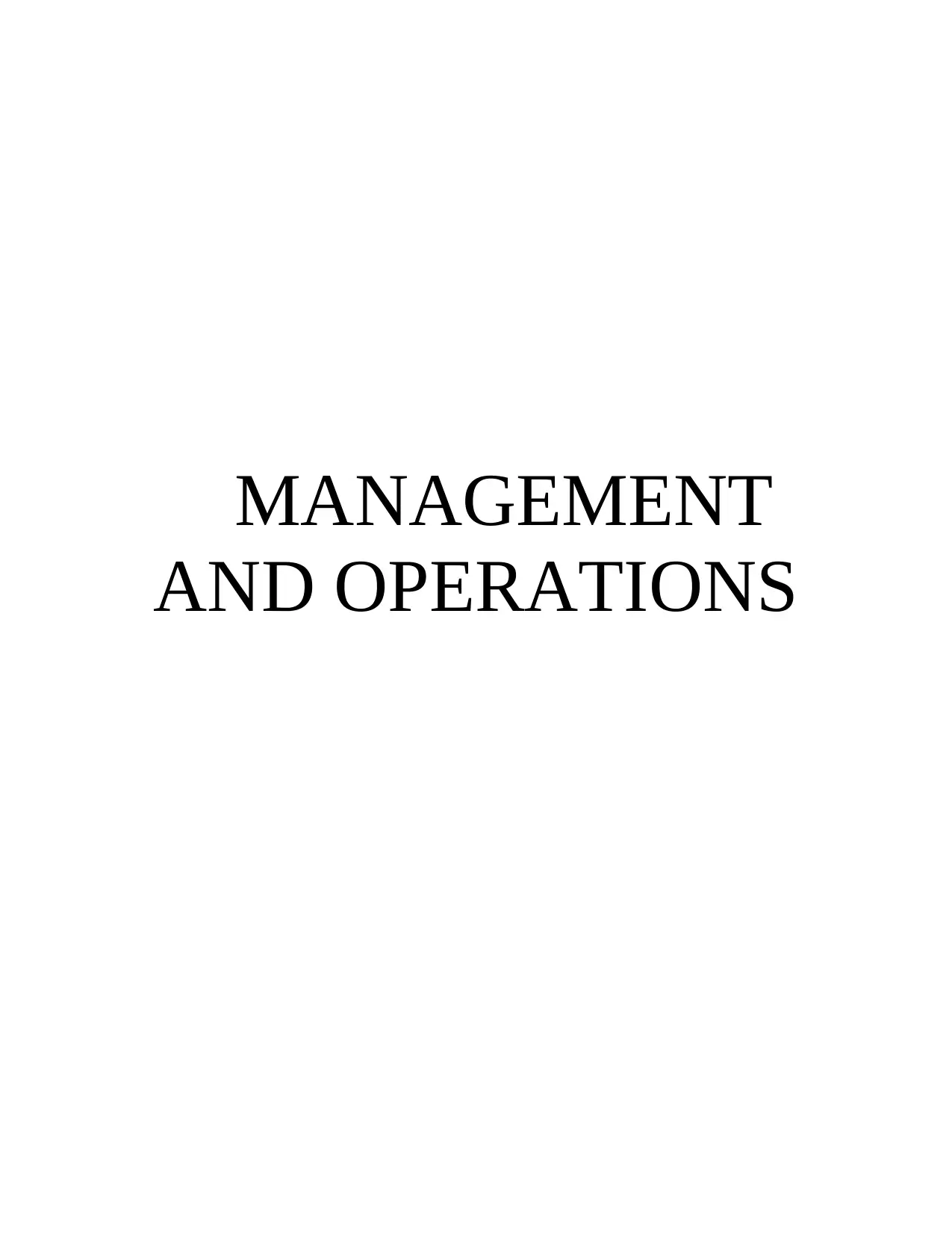
MANAGEMENT
AND OPERATIONS
AND OPERATIONS
Paraphrase This Document
Need a fresh take? Get an instant paraphrase of this document with our AI Paraphraser
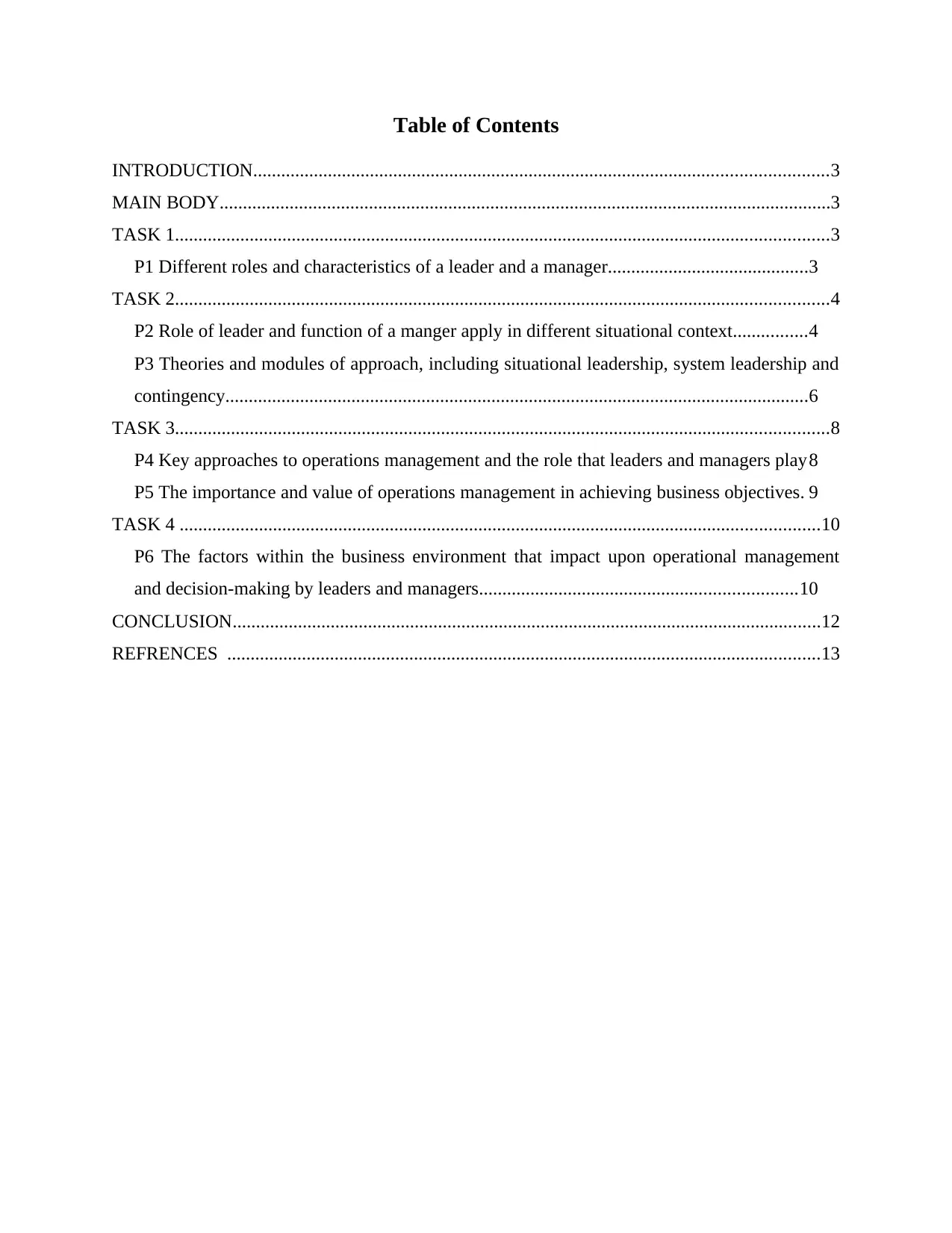
Table of Contents
INTRODUCTION...........................................................................................................................3
MAIN BODY...................................................................................................................................3
TASK 1............................................................................................................................................3
P1 Different roles and characteristics of a leader and a manager...........................................3
TASK 2............................................................................................................................................4
P2 Role of leader and function of a manger apply in different situational context................4
P3 Theories and modules of approach, including situational leadership, system leadership and
contingency.............................................................................................................................6
TASK 3............................................................................................................................................8
P4 Key approaches to operations management and the role that leaders and managers play8
P5 The importance and value of operations management in achieving business objectives. 9
TASK 4 .........................................................................................................................................10
P6 The factors within the business environment that impact upon operational management
and decision-making by leaders and managers....................................................................10
CONCLUSION..............................................................................................................................12
REFRENCES ...............................................................................................................................13
INTRODUCTION...........................................................................................................................3
MAIN BODY...................................................................................................................................3
TASK 1............................................................................................................................................3
P1 Different roles and characteristics of a leader and a manager...........................................3
TASK 2............................................................................................................................................4
P2 Role of leader and function of a manger apply in different situational context................4
P3 Theories and modules of approach, including situational leadership, system leadership and
contingency.............................................................................................................................6
TASK 3............................................................................................................................................8
P4 Key approaches to operations management and the role that leaders and managers play8
P5 The importance and value of operations management in achieving business objectives. 9
TASK 4 .........................................................................................................................................10
P6 The factors within the business environment that impact upon operational management
and decision-making by leaders and managers....................................................................10
CONCLUSION..............................................................................................................................12
REFRENCES ...............................................................................................................................13
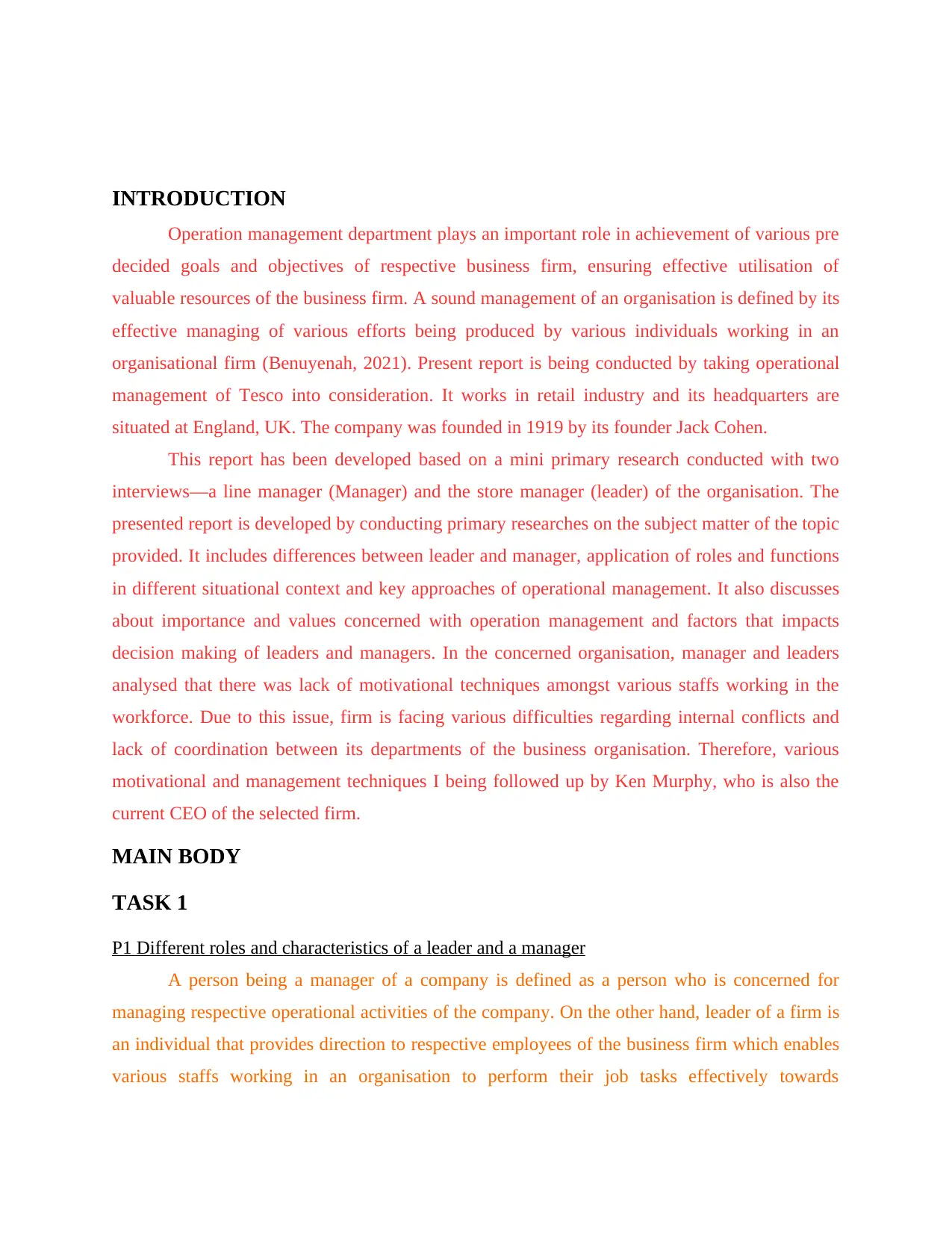
INTRODUCTION
Operation management department plays an important role in achievement of various pre
decided goals and objectives of respective business firm, ensuring effective utilisation of
valuable resources of the business firm. A sound management of an organisation is defined by its
effective managing of various efforts being produced by various individuals working in an
organisational firm (Benuyenah, 2021). Present report is being conducted by taking operational
management of Tesco into consideration. It works in retail industry and its headquarters are
situated at England, UK. The company was founded in 1919 by its founder Jack Cohen.
This report has been developed based on a mini primary research conducted with two
interviews—a line manager (Manager) and the store manager (leader) of the organisation. The
presented report is developed by conducting primary researches on the subject matter of the topic
provided. It includes differences between leader and manager, application of roles and functions
in different situational context and key approaches of operational management. It also discusses
about importance and values concerned with operation management and factors that impacts
decision making of leaders and managers. In the concerned organisation, manager and leaders
analysed that there was lack of motivational techniques amongst various staffs working in the
workforce. Due to this issue, firm is facing various difficulties regarding internal conflicts and
lack of coordination between its departments of the business organisation. Therefore, various
motivational and management techniques I being followed up by Ken Murphy, who is also the
current CEO of the selected firm.
MAIN BODY
TASK 1
P1 Different roles and characteristics of a leader and a manager
A person being a manager of a company is defined as a person who is concerned for
managing respective operational activities of the company. On the other hand, leader of a firm is
an individual that provides direction to respective employees of the business firm which enables
various staffs working in an organisation to perform their job tasks effectively towards
Operation management department plays an important role in achievement of various pre
decided goals and objectives of respective business firm, ensuring effective utilisation of
valuable resources of the business firm. A sound management of an organisation is defined by its
effective managing of various efforts being produced by various individuals working in an
organisational firm (Benuyenah, 2021). Present report is being conducted by taking operational
management of Tesco into consideration. It works in retail industry and its headquarters are
situated at England, UK. The company was founded in 1919 by its founder Jack Cohen.
This report has been developed based on a mini primary research conducted with two
interviews—a line manager (Manager) and the store manager (leader) of the organisation. The
presented report is developed by conducting primary researches on the subject matter of the topic
provided. It includes differences between leader and manager, application of roles and functions
in different situational context and key approaches of operational management. It also discusses
about importance and values concerned with operation management and factors that impacts
decision making of leaders and managers. In the concerned organisation, manager and leaders
analysed that there was lack of motivational techniques amongst various staffs working in the
workforce. Due to this issue, firm is facing various difficulties regarding internal conflicts and
lack of coordination between its departments of the business organisation. Therefore, various
motivational and management techniques I being followed up by Ken Murphy, who is also the
current CEO of the selected firm.
MAIN BODY
TASK 1
P1 Different roles and characteristics of a leader and a manager
A person being a manager of a company is defined as a person who is concerned for
managing respective operational activities of the company. On the other hand, leader of a firm is
an individual that provides direction to respective employees of the business firm which enables
various staffs working in an organisation to perform their job tasks effectively towards
⊘ This is a preview!⊘
Do you want full access?
Subscribe today to unlock all pages.

Trusted by 1+ million students worldwide
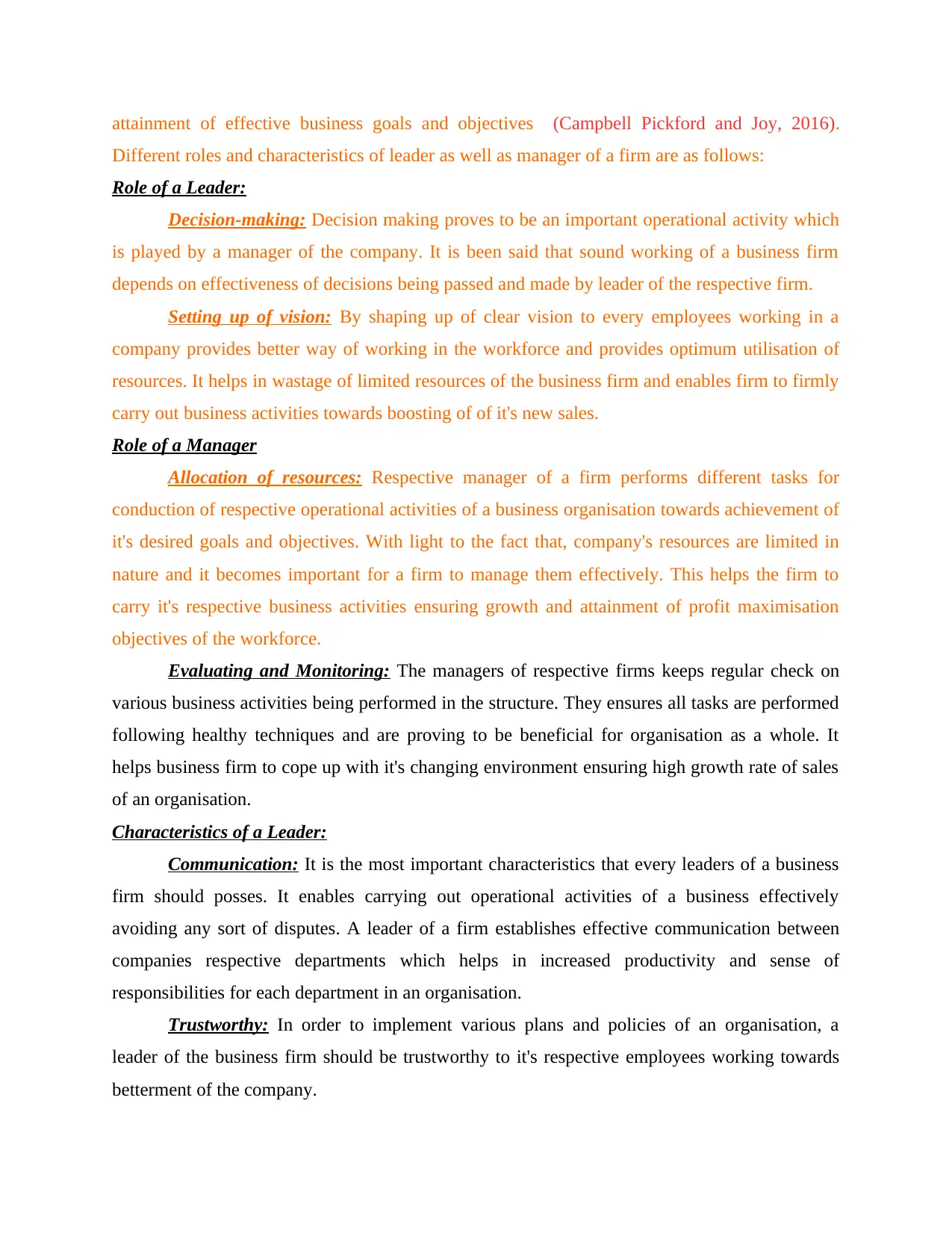
attainment of effective business goals and objectives (Campbell Pickford and Joy, 2016).
Different roles and characteristics of leader as well as manager of a firm are as follows:
Role of a Leader:
Decision-making: Decision making proves to be an important operational activity which
is played by a manager of the company. It is been said that sound working of a business firm
depends on effectiveness of decisions being passed and made by leader of the respective firm.
Setting up of vision: By shaping up of clear vision to every employees working in a
company provides better way of working in the workforce and provides optimum utilisation of
resources. It helps in wastage of limited resources of the business firm and enables firm to firmly
carry out business activities towards boosting of of it's new sales.
Role of a Manager
Allocation of resources: Respective manager of a firm performs different tasks for
conduction of respective operational activities of a business organisation towards achievement of
it's desired goals and objectives. With light to the fact that, company's resources are limited in
nature and it becomes important for a firm to manage them effectively. This helps the firm to
carry it's respective business activities ensuring growth and attainment of profit maximisation
objectives of the workforce.
Evaluating and Monitoring: The managers of respective firms keeps regular check on
various business activities being performed in the structure. They ensures all tasks are performed
following healthy techniques and are proving to be beneficial for organisation as a whole. It
helps business firm to cope up with it's changing environment ensuring high growth rate of sales
of an organisation.
Characteristics of a Leader:
Communication: It is the most important characteristics that every leaders of a business
firm should posses. It enables carrying out operational activities of a business effectively
avoiding any sort of disputes. A leader of a firm establishes effective communication between
companies respective departments which helps in increased productivity and sense of
responsibilities for each department in an organisation.
Trustworthy: In order to implement various plans and policies of an organisation, a
leader of the business firm should be trustworthy to it's respective employees working towards
betterment of the company.
Different roles and characteristics of leader as well as manager of a firm are as follows:
Role of a Leader:
Decision-making: Decision making proves to be an important operational activity which
is played by a manager of the company. It is been said that sound working of a business firm
depends on effectiveness of decisions being passed and made by leader of the respective firm.
Setting up of vision: By shaping up of clear vision to every employees working in a
company provides better way of working in the workforce and provides optimum utilisation of
resources. It helps in wastage of limited resources of the business firm and enables firm to firmly
carry out business activities towards boosting of of it's new sales.
Role of a Manager
Allocation of resources: Respective manager of a firm performs different tasks for
conduction of respective operational activities of a business organisation towards achievement of
it's desired goals and objectives. With light to the fact that, company's resources are limited in
nature and it becomes important for a firm to manage them effectively. This helps the firm to
carry it's respective business activities ensuring growth and attainment of profit maximisation
objectives of the workforce.
Evaluating and Monitoring: The managers of respective firms keeps regular check on
various business activities being performed in the structure. They ensures all tasks are performed
following healthy techniques and are proving to be beneficial for organisation as a whole. It
helps business firm to cope up with it's changing environment ensuring high growth rate of sales
of an organisation.
Characteristics of a Leader:
Communication: It is the most important characteristics that every leaders of a business
firm should posses. It enables carrying out operational activities of a business effectively
avoiding any sort of disputes. A leader of a firm establishes effective communication between
companies respective departments which helps in increased productivity and sense of
responsibilities for each department in an organisation.
Trustworthy: In order to implement various plans and policies of an organisation, a
leader of the business firm should be trustworthy to it's respective employees working towards
betterment of the company.
Paraphrase This Document
Need a fresh take? Get an instant paraphrase of this document with our AI Paraphraser
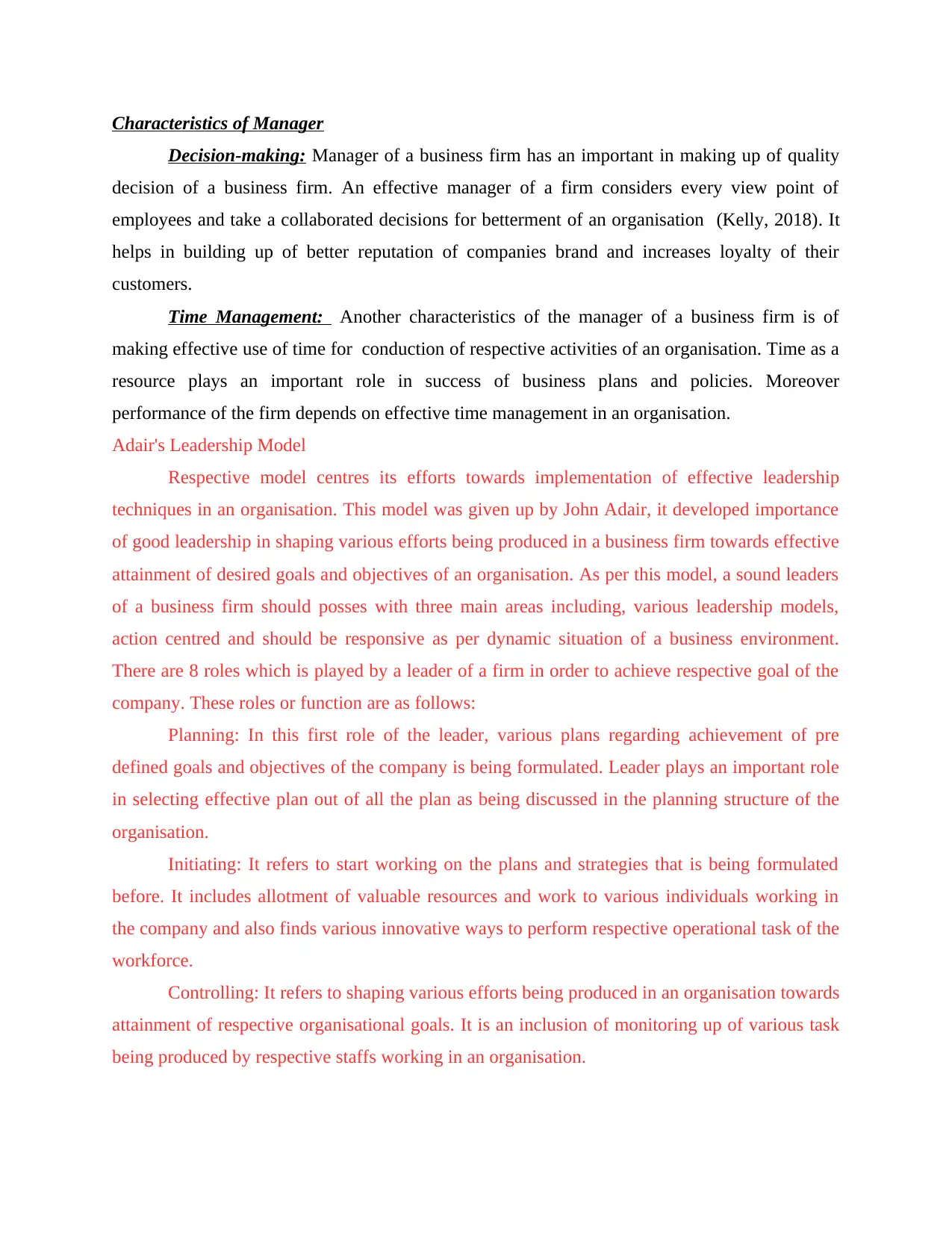
Characteristics of Manager
Decision-making: Manager of a business firm has an important in making up of quality
decision of a business firm. An effective manager of a firm considers every view point of
employees and take a collaborated decisions for betterment of an organisation (Kelly, 2018). It
helps in building up of better reputation of companies brand and increases loyalty of their
customers.
Time Management: Another characteristics of the manager of a business firm is of
making effective use of time for conduction of respective activities of an organisation. Time as a
resource plays an important role in success of business plans and policies. Moreover
performance of the firm depends on effective time management in an organisation.
Adair's Leadership Model
Respective model centres its efforts towards implementation of effective leadership
techniques in an organisation. This model was given up by John Adair, it developed importance
of good leadership in shaping various efforts being produced in a business firm towards effective
attainment of desired goals and objectives of an organisation. As per this model, a sound leaders
of a business firm should posses with three main areas including, various leadership models,
action centred and should be responsive as per dynamic situation of a business environment.
There are 8 roles which is played by a leader of a firm in order to achieve respective goal of the
company. These roles or function are as follows:
Planning: In this first role of the leader, various plans regarding achievement of pre
defined goals and objectives of the company is being formulated. Leader plays an important role
in selecting effective plan out of all the plan as being discussed in the planning structure of the
organisation.
Initiating: It refers to start working on the plans and strategies that is being formulated
before. It includes allotment of valuable resources and work to various individuals working in
the company and also finds various innovative ways to perform respective operational task of the
workforce.
Controlling: It refers to shaping various efforts being produced in an organisation towards
attainment of respective organisational goals. It is an inclusion of monitoring up of various task
being produced by respective staffs working in an organisation.
Decision-making: Manager of a business firm has an important in making up of quality
decision of a business firm. An effective manager of a firm considers every view point of
employees and take a collaborated decisions for betterment of an organisation (Kelly, 2018). It
helps in building up of better reputation of companies brand and increases loyalty of their
customers.
Time Management: Another characteristics of the manager of a business firm is of
making effective use of time for conduction of respective activities of an organisation. Time as a
resource plays an important role in success of business plans and policies. Moreover
performance of the firm depends on effective time management in an organisation.
Adair's Leadership Model
Respective model centres its efforts towards implementation of effective leadership
techniques in an organisation. This model was given up by John Adair, it developed importance
of good leadership in shaping various efforts being produced in a business firm towards effective
attainment of desired goals and objectives of an organisation. As per this model, a sound leaders
of a business firm should posses with three main areas including, various leadership models,
action centred and should be responsive as per dynamic situation of a business environment.
There are 8 roles which is played by a leader of a firm in order to achieve respective goal of the
company. These roles or function are as follows:
Planning: In this first role of the leader, various plans regarding achievement of pre
defined goals and objectives of the company is being formulated. Leader plays an important role
in selecting effective plan out of all the plan as being discussed in the planning structure of the
organisation.
Initiating: It refers to start working on the plans and strategies that is being formulated
before. It includes allotment of valuable resources and work to various individuals working in
the company and also finds various innovative ways to perform respective operational task of the
workforce.
Controlling: It refers to shaping various efforts being produced in an organisation towards
attainment of respective organisational goals. It is an inclusion of monitoring up of various task
being produced by respective staffs working in an organisation.
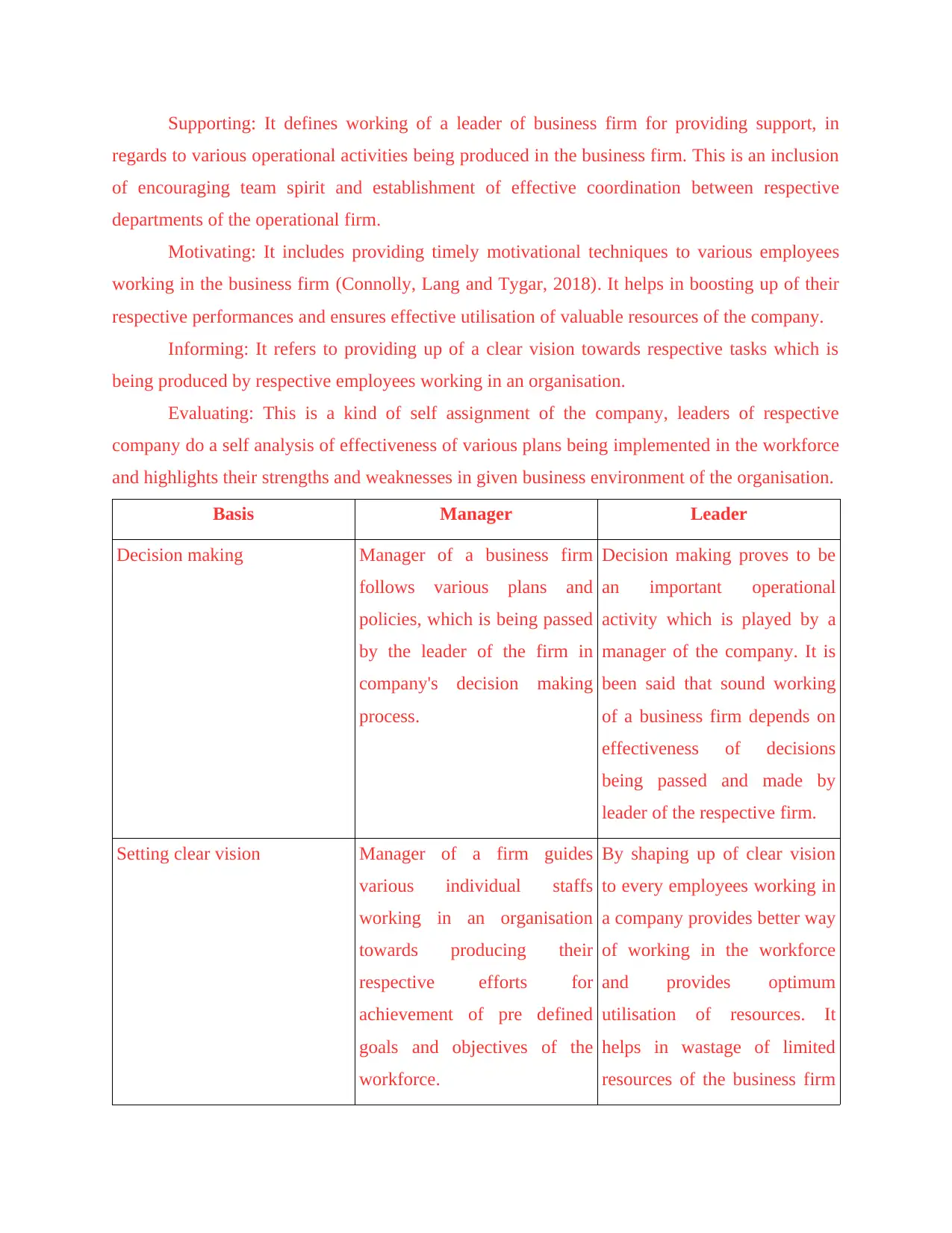
Supporting: It defines working of a leader of business firm for providing support, in
regards to various operational activities being produced in the business firm. This is an inclusion
of encouraging team spirit and establishment of effective coordination between respective
departments of the operational firm.
Motivating: It includes providing timely motivational techniques to various employees
working in the business firm (Connolly, Lang and Tygar, 2018). It helps in boosting up of their
respective performances and ensures effective utilisation of valuable resources of the company.
Informing: It refers to providing up of a clear vision towards respective tasks which is
being produced by respective employees working in an organisation.
Evaluating: This is a kind of self assignment of the company, leaders of respective
company do a self analysis of effectiveness of various plans being implemented in the workforce
and highlights their strengths and weaknesses in given business environment of the organisation.
Basis Manager Leader
Decision making Manager of a business firm
follows various plans and
policies, which is being passed
by the leader of the firm in
company's decision making
process.
Decision making proves to be
an important operational
activity which is played by a
manager of the company. It is
been said that sound working
of a business firm depends on
effectiveness of decisions
being passed and made by
leader of the respective firm.
Setting clear vision Manager of a firm guides
various individual staffs
working in an organisation
towards producing their
respective efforts for
achievement of pre defined
goals and objectives of the
workforce.
By shaping up of clear vision
to every employees working in
a company provides better way
of working in the workforce
and provides optimum
utilisation of resources. It
helps in wastage of limited
resources of the business firm
regards to various operational activities being produced in the business firm. This is an inclusion
of encouraging team spirit and establishment of effective coordination between respective
departments of the operational firm.
Motivating: It includes providing timely motivational techniques to various employees
working in the business firm (Connolly, Lang and Tygar, 2018). It helps in boosting up of their
respective performances and ensures effective utilisation of valuable resources of the company.
Informing: It refers to providing up of a clear vision towards respective tasks which is
being produced by respective employees working in an organisation.
Evaluating: This is a kind of self assignment of the company, leaders of respective
company do a self analysis of effectiveness of various plans being implemented in the workforce
and highlights their strengths and weaknesses in given business environment of the organisation.
Basis Manager Leader
Decision making Manager of a business firm
follows various plans and
policies, which is being passed
by the leader of the firm in
company's decision making
process.
Decision making proves to be
an important operational
activity which is played by a
manager of the company. It is
been said that sound working
of a business firm depends on
effectiveness of decisions
being passed and made by
leader of the respective firm.
Setting clear vision Manager of a firm guides
various individual staffs
working in an organisation
towards producing their
respective efforts for
achievement of pre defined
goals and objectives of the
workforce.
By shaping up of clear vision
to every employees working in
a company provides better way
of working in the workforce
and provides optimum
utilisation of resources. It
helps in wastage of limited
resources of the business firm
⊘ This is a preview!⊘
Do you want full access?
Subscribe today to unlock all pages.

Trusted by 1+ million students worldwide
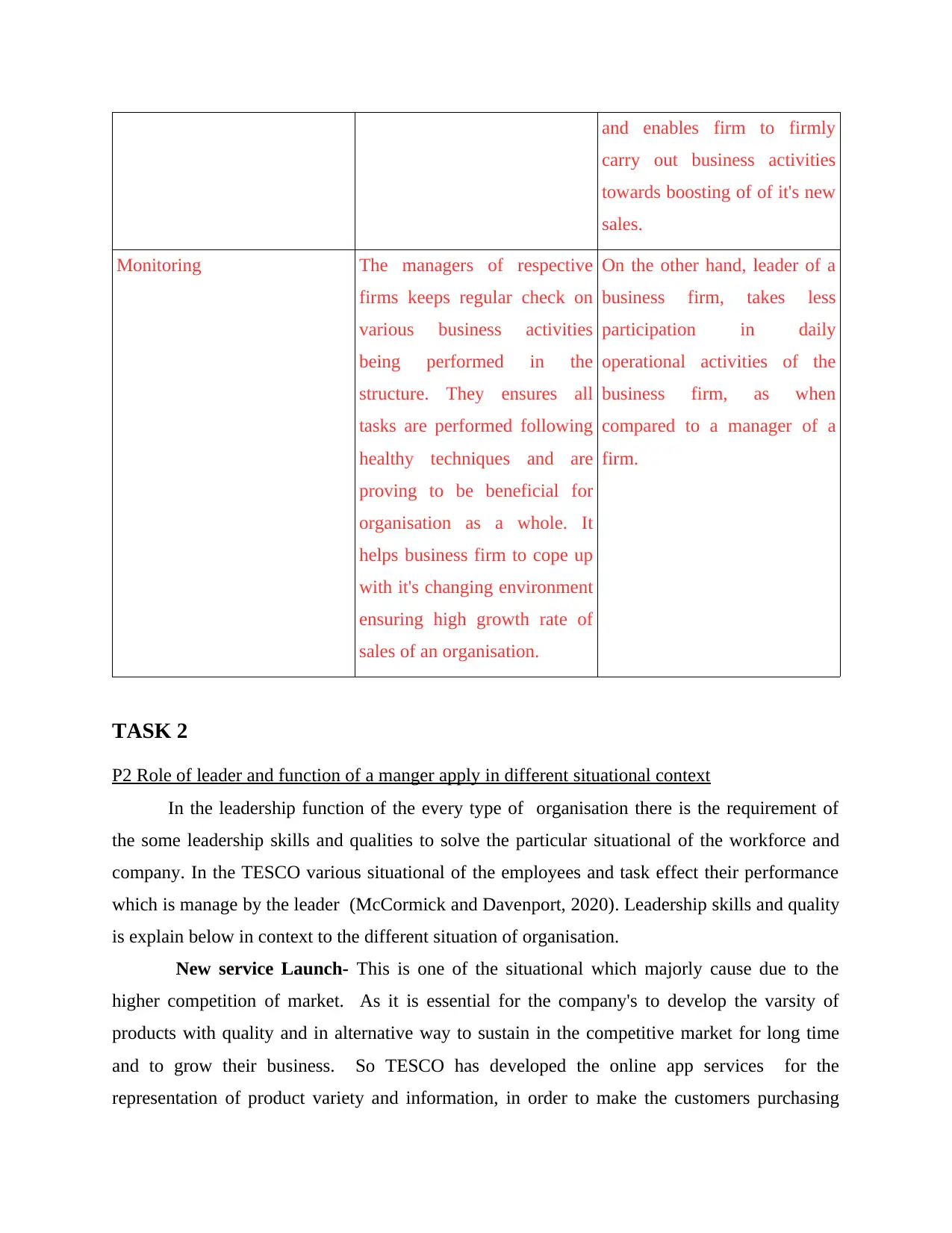
and enables firm to firmly
carry out business activities
towards boosting of of it's new
sales.
Monitoring The managers of respective
firms keeps regular check on
various business activities
being performed in the
structure. They ensures all
tasks are performed following
healthy techniques and are
proving to be beneficial for
organisation as a whole. It
helps business firm to cope up
with it's changing environment
ensuring high growth rate of
sales of an organisation.
On the other hand, leader of a
business firm, takes less
participation in daily
operational activities of the
business firm, as when
compared to a manager of a
firm.
TASK 2
P2 Role of leader and function of a manger apply in different situational context
In the leadership function of the every type of organisation there is the requirement of
the some leadership skills and qualities to solve the particular situational of the workforce and
company. In the TESCO various situational of the employees and task effect their performance
which is manage by the leader (McCormick and Davenport, 2020). Leadership skills and quality
is explain below in context to the different situation of organisation.
New service Launch- This is one of the situational which majorly cause due to the
higher competition of market. As it is essential for the company's to develop the varsity of
products with quality and in alternative way to sustain in the competitive market for long time
and to grow their business. So TESCO has developed the online app services for the
representation of product variety and information, in order to make the customers purchasing
carry out business activities
towards boosting of of it's new
sales.
Monitoring The managers of respective
firms keeps regular check on
various business activities
being performed in the
structure. They ensures all
tasks are performed following
healthy techniques and are
proving to be beneficial for
organisation as a whole. It
helps business firm to cope up
with it's changing environment
ensuring high growth rate of
sales of an organisation.
On the other hand, leader of a
business firm, takes less
participation in daily
operational activities of the
business firm, as when
compared to a manager of a
firm.
TASK 2
P2 Role of leader and function of a manger apply in different situational context
In the leadership function of the every type of organisation there is the requirement of
the some leadership skills and qualities to solve the particular situational of the workforce and
company. In the TESCO various situational of the employees and task effect their performance
which is manage by the leader (McCormick and Davenport, 2020). Leadership skills and quality
is explain below in context to the different situation of organisation.
New service Launch- This is one of the situational which majorly cause due to the
higher competition of market. As it is essential for the company's to develop the varsity of
products with quality and in alternative way to sustain in the competitive market for long time
and to grow their business. So TESCO has developed the online app services for the
representation of product variety and information, in order to make the customers purchasing
Paraphrase This Document
Need a fresh take? Get an instant paraphrase of this document with our AI Paraphraser
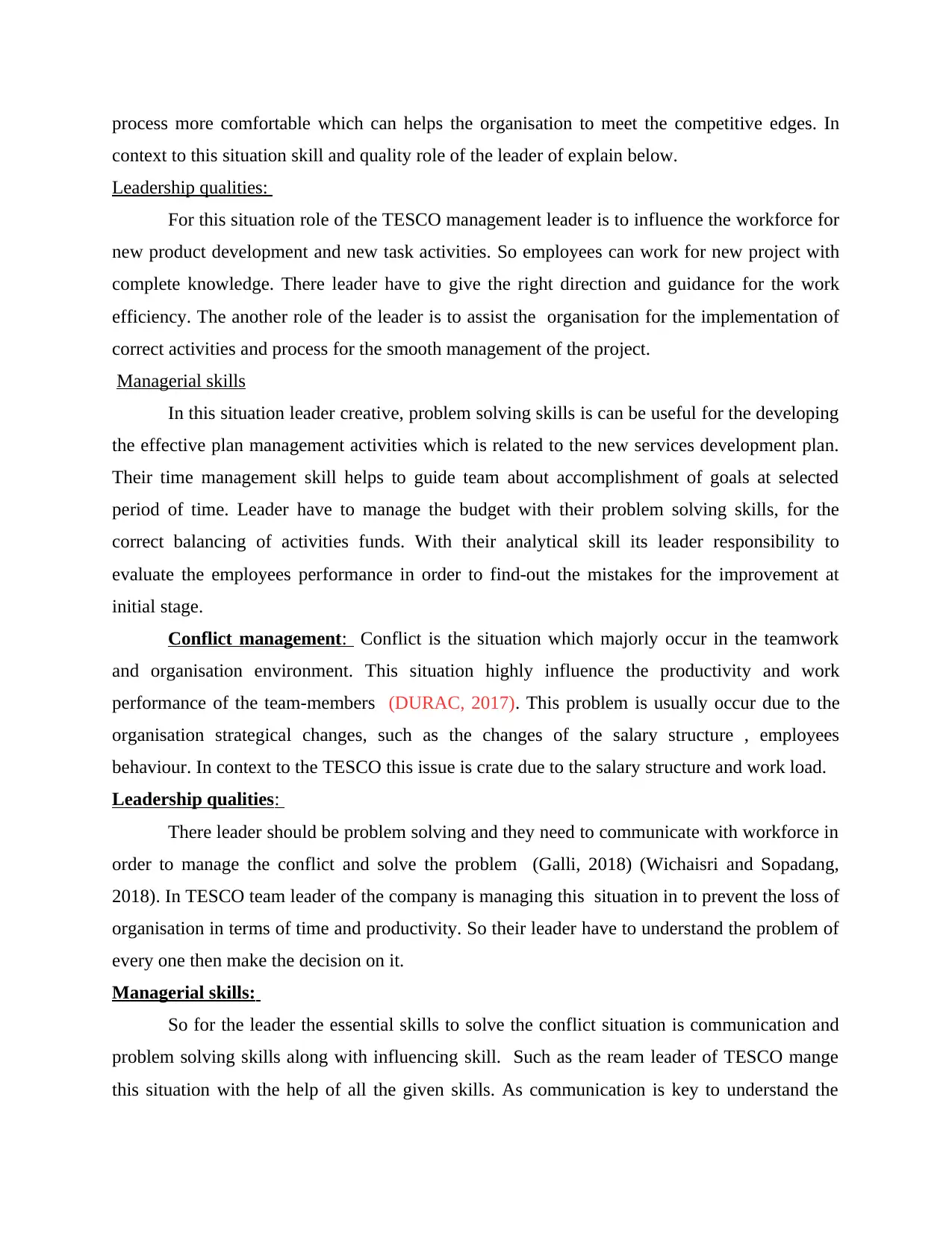
process more comfortable which can helps the organisation to meet the competitive edges. In
context to this situation skill and quality role of the leader of explain below.
Leadership qualities:
For this situation role of the TESCO management leader is to influence the workforce for
new product development and new task activities. So employees can work for new project with
complete knowledge. There leader have to give the right direction and guidance for the work
efficiency. The another role of the leader is to assist the organisation for the implementation of
correct activities and process for the smooth management of the project.
Managerial skills
In this situation leader creative, problem solving skills is can be useful for the developing
the effective plan management activities which is related to the new services development plan.
Their time management skill helps to guide team about accomplishment of goals at selected
period of time. Leader have to manage the budget with their problem solving skills, for the
correct balancing of activities funds. With their analytical skill its leader responsibility to
evaluate the employees performance in order to find-out the mistakes for the improvement at
initial stage.
Conflict management: Conflict is the situation which majorly occur in the teamwork
and organisation environment. This situation highly influence the productivity and work
performance of the team-members (DURAC, 2017). This problem is usually occur due to the
organisation strategical changes, such as the changes of the salary structure , employees
behaviour. In context to the TESCO this issue is crate due to the salary structure and work load.
Leadership qualities:
There leader should be problem solving and they need to communicate with workforce in
order to manage the conflict and solve the problem (Galli, 2018) (Wichaisri and Sopadang,
2018). In TESCO team leader of the company is managing this situation in to prevent the loss of
organisation in terms of time and productivity. So their leader have to understand the problem of
every one then make the decision on it.
Managerial skills:
So for the leader the essential skills to solve the conflict situation is communication and
problem solving skills along with influencing skill. Such as the ream leader of TESCO mange
this situation with the help of all the given skills. As communication is key to understand the
context to this situation skill and quality role of the leader of explain below.
Leadership qualities:
For this situation role of the TESCO management leader is to influence the workforce for
new product development and new task activities. So employees can work for new project with
complete knowledge. There leader have to give the right direction and guidance for the work
efficiency. The another role of the leader is to assist the organisation for the implementation of
correct activities and process for the smooth management of the project.
Managerial skills
In this situation leader creative, problem solving skills is can be useful for the developing
the effective plan management activities which is related to the new services development plan.
Their time management skill helps to guide team about accomplishment of goals at selected
period of time. Leader have to manage the budget with their problem solving skills, for the
correct balancing of activities funds. With their analytical skill its leader responsibility to
evaluate the employees performance in order to find-out the mistakes for the improvement at
initial stage.
Conflict management: Conflict is the situation which majorly occur in the teamwork
and organisation environment. This situation highly influence the productivity and work
performance of the team-members (DURAC, 2017). This problem is usually occur due to the
organisation strategical changes, such as the changes of the salary structure , employees
behaviour. In context to the TESCO this issue is crate due to the salary structure and work load.
Leadership qualities:
There leader should be problem solving and they need to communicate with workforce in
order to manage the conflict and solve the problem (Galli, 2018) (Wichaisri and Sopadang,
2018). In TESCO team leader of the company is managing this situation in to prevent the loss of
organisation in terms of time and productivity. So their leader have to understand the problem of
every one then make the decision on it.
Managerial skills:
So for the leader the essential skills to solve the conflict situation is communication and
problem solving skills along with influencing skill. Such as the ream leader of TESCO mange
this situation with the help of all the given skills. As communication is key to understand the
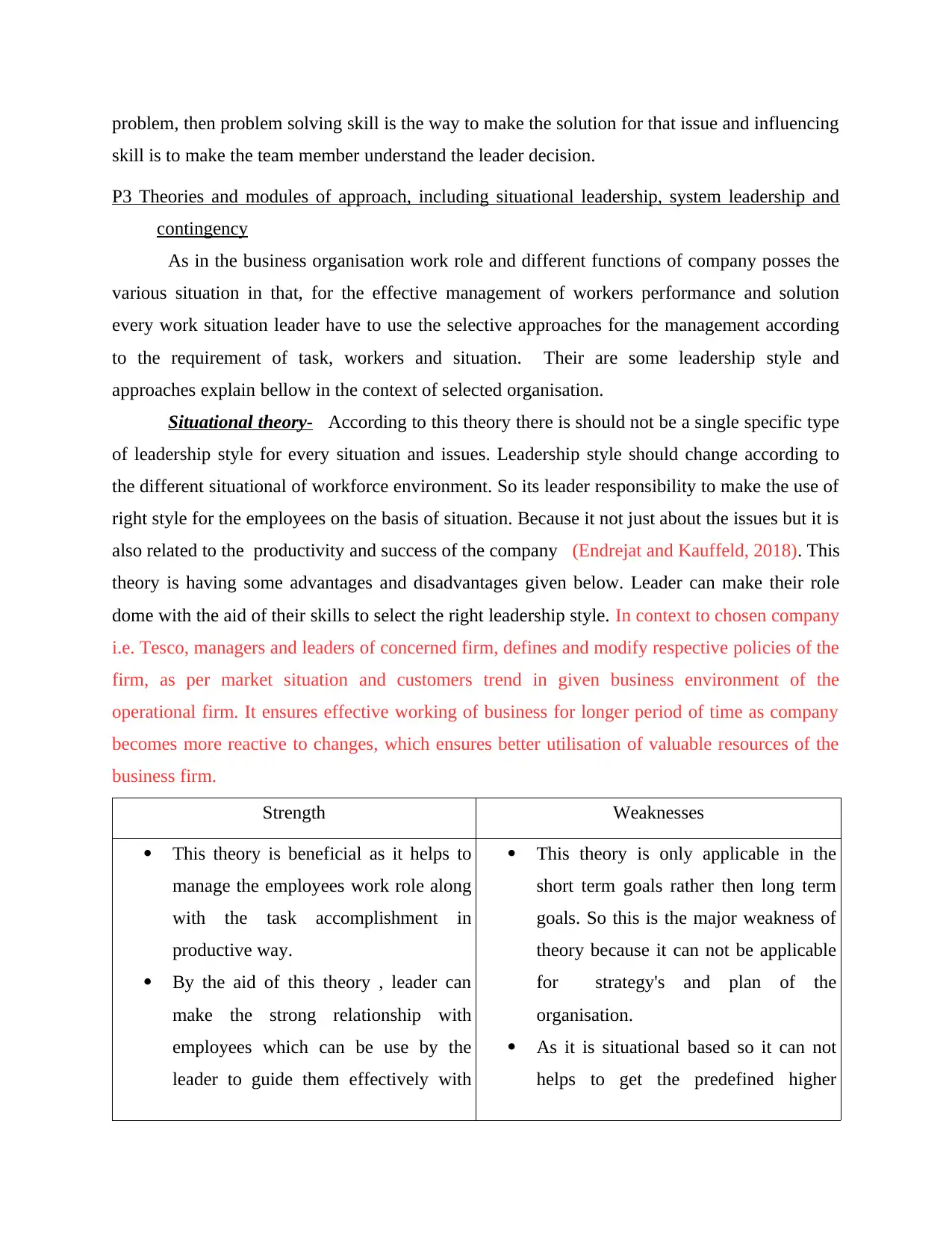
problem, then problem solving skill is the way to make the solution for that issue and influencing
skill is to make the team member understand the leader decision.
P3 Theories and modules of approach, including situational leadership, system leadership and
contingency
As in the business organisation work role and different functions of company posses the
various situation in that, for the effective management of workers performance and solution
every work situation leader have to use the selective approaches for the management according
to the requirement of task, workers and situation. Their are some leadership style and
approaches explain bellow in the context of selected organisation.
Situational theory- According to this theory there is should not be a single specific type
of leadership style for every situation and issues. Leadership style should change according to
the different situational of workforce environment. So its leader responsibility to make the use of
right style for the employees on the basis of situation. Because it not just about the issues but it is
also related to the productivity and success of the company (Endrejat and Kauffeld, 2018). This
theory is having some advantages and disadvantages given below. Leader can make their role
dome with the aid of their skills to select the right leadership style. In context to chosen company
i.e. Tesco, managers and leaders of concerned firm, defines and modify respective policies of the
firm, as per market situation and customers trend in given business environment of the
operational firm. It ensures effective working of business for longer period of time as company
becomes more reactive to changes, which ensures better utilisation of valuable resources of the
business firm.
Strength Weaknesses
This theory is beneficial as it helps to
manage the employees work role along
with the task accomplishment in
productive way.
By the aid of this theory , leader can
make the strong relationship with
employees which can be use by the
leader to guide them effectively with
This theory is only applicable in the
short term goals rather then long term
goals. So this is the major weakness of
theory because it can not be applicable
for strategy's and plan of the
organisation.
As it is situational based so it can not
helps to get the predefined higher
skill is to make the team member understand the leader decision.
P3 Theories and modules of approach, including situational leadership, system leadership and
contingency
As in the business organisation work role and different functions of company posses the
various situation in that, for the effective management of workers performance and solution
every work situation leader have to use the selective approaches for the management according
to the requirement of task, workers and situation. Their are some leadership style and
approaches explain bellow in the context of selected organisation.
Situational theory- According to this theory there is should not be a single specific type
of leadership style for every situation and issues. Leadership style should change according to
the different situational of workforce environment. So its leader responsibility to make the use of
right style for the employees on the basis of situation. Because it not just about the issues but it is
also related to the productivity and success of the company (Endrejat and Kauffeld, 2018). This
theory is having some advantages and disadvantages given below. Leader can make their role
dome with the aid of their skills to select the right leadership style. In context to chosen company
i.e. Tesco, managers and leaders of concerned firm, defines and modify respective policies of the
firm, as per market situation and customers trend in given business environment of the
operational firm. It ensures effective working of business for longer period of time as company
becomes more reactive to changes, which ensures better utilisation of valuable resources of the
business firm.
Strength Weaknesses
This theory is beneficial as it helps to
manage the employees work role along
with the task accomplishment in
productive way.
By the aid of this theory , leader can
make the strong relationship with
employees which can be use by the
leader to guide them effectively with
This theory is only applicable in the
short term goals rather then long term
goals. So this is the major weakness of
theory because it can not be applicable
for strategy's and plan of the
organisation.
As it is situational based so it can not
helps to get the predefined higher
⊘ This is a preview!⊘
Do you want full access?
Subscribe today to unlock all pages.

Trusted by 1+ million students worldwide
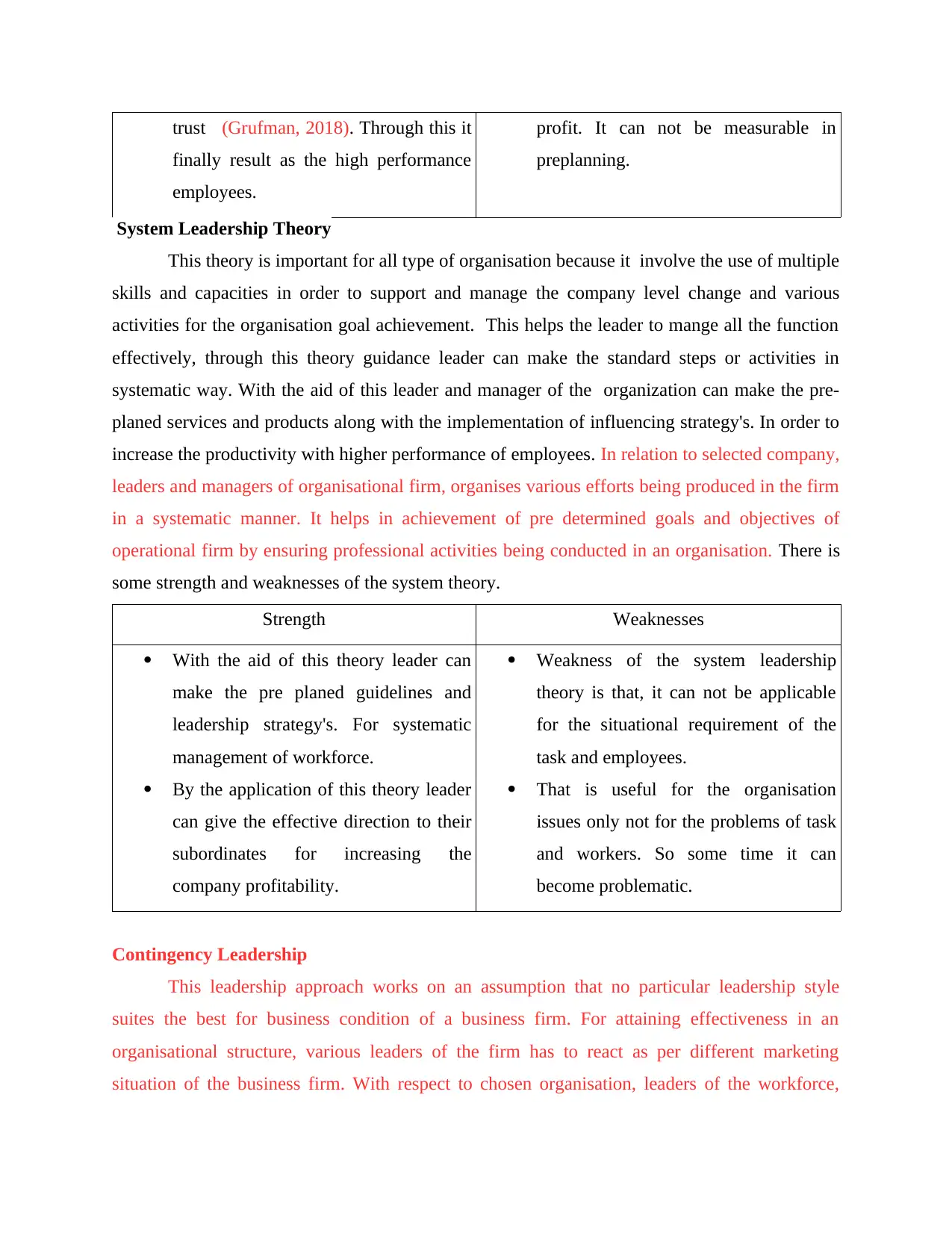
trust (Grufman, 2018). Through this it
finally result as the high performance
employees.
profit. It can not be measurable in
preplanning.
System Leadership Theory
This theory is important for all type of organisation because it involve the use of multiple
skills and capacities in order to support and manage the company level change and various
activities for the organisation goal achievement. This helps the leader to mange all the function
effectively, through this theory guidance leader can make the standard steps or activities in
systematic way. With the aid of this leader and manager of the organization can make the pre-
planed services and products along with the implementation of influencing strategy's. In order to
increase the productivity with higher performance of employees. In relation to selected company,
leaders and managers of organisational firm, organises various efforts being produced in the firm
in a systematic manner. It helps in achievement of pre determined goals and objectives of
operational firm by ensuring professional activities being conducted in an organisation. There is
some strength and weaknesses of the system theory.
Strength Weaknesses
With the aid of this theory leader can
make the pre planed guidelines and
leadership strategy's. For systematic
management of workforce.
By the application of this theory leader
can give the effective direction to their
subordinates for increasing the
company profitability.
Weakness of the system leadership
theory is that, it can not be applicable
for the situational requirement of the
task and employees.
That is useful for the organisation
issues only not for the problems of task
and workers. So some time it can
become problematic.
Contingency Leadership
This leadership approach works on an assumption that no particular leadership style
suites the best for business condition of a business firm. For attaining effectiveness in an
organisational structure, various leaders of the firm has to react as per different marketing
situation of the business firm. With respect to chosen organisation, leaders of the workforce,
finally result as the high performance
employees.
profit. It can not be measurable in
preplanning.
System Leadership Theory
This theory is important for all type of organisation because it involve the use of multiple
skills and capacities in order to support and manage the company level change and various
activities for the organisation goal achievement. This helps the leader to mange all the function
effectively, through this theory guidance leader can make the standard steps or activities in
systematic way. With the aid of this leader and manager of the organization can make the pre-
planed services and products along with the implementation of influencing strategy's. In order to
increase the productivity with higher performance of employees. In relation to selected company,
leaders and managers of organisational firm, organises various efforts being produced in the firm
in a systematic manner. It helps in achievement of pre determined goals and objectives of
operational firm by ensuring professional activities being conducted in an organisation. There is
some strength and weaknesses of the system theory.
Strength Weaknesses
With the aid of this theory leader can
make the pre planed guidelines and
leadership strategy's. For systematic
management of workforce.
By the application of this theory leader
can give the effective direction to their
subordinates for increasing the
company profitability.
Weakness of the system leadership
theory is that, it can not be applicable
for the situational requirement of the
task and employees.
That is useful for the organisation
issues only not for the problems of task
and workers. So some time it can
become problematic.
Contingency Leadership
This leadership approach works on an assumption that no particular leadership style
suites the best for business condition of a business firm. For attaining effectiveness in an
organisational structure, various leaders of the firm has to react as per different marketing
situation of the business firm. With respect to chosen organisation, leaders of the workforce,
Paraphrase This Document
Need a fresh take? Get an instant paraphrase of this document with our AI Paraphraser
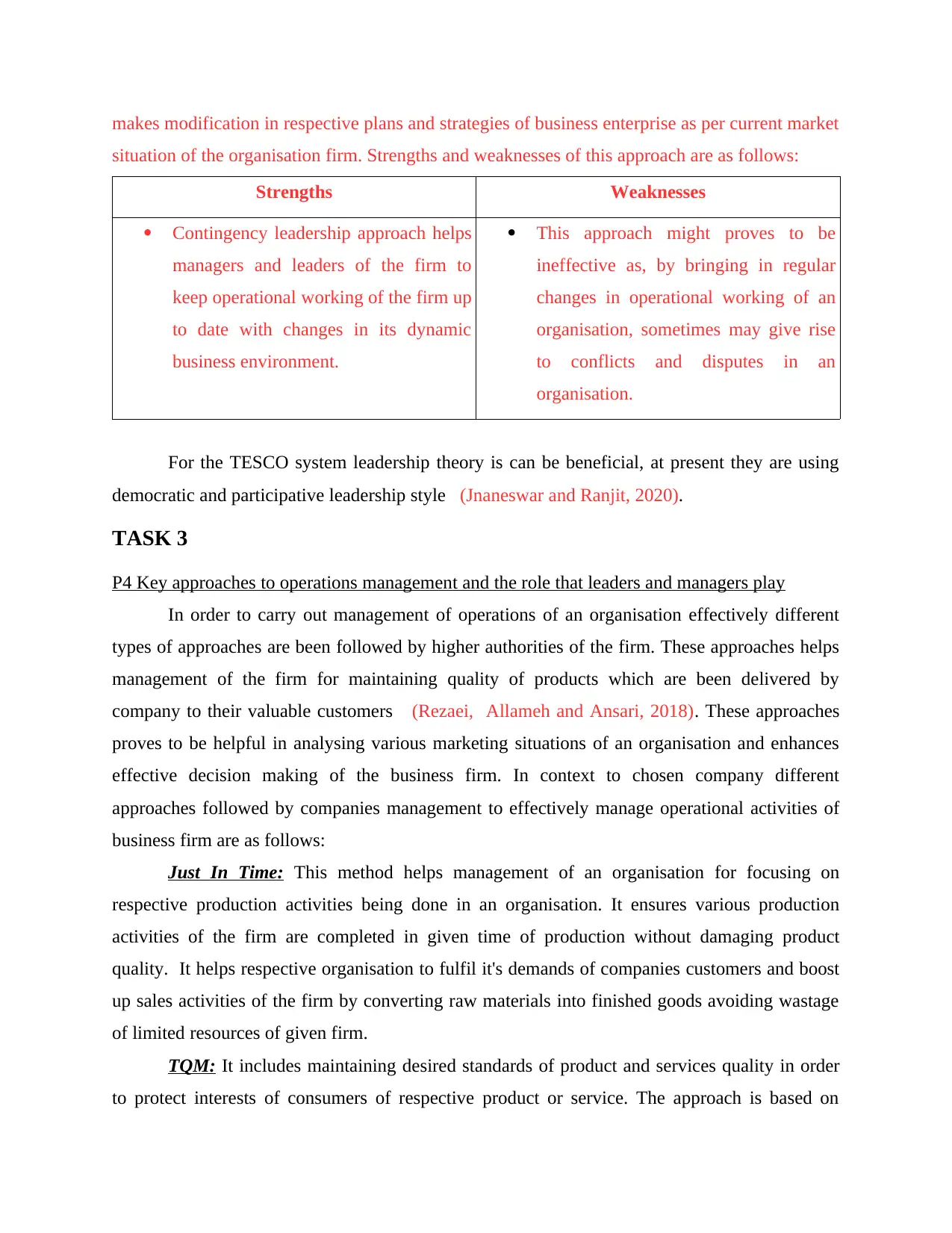
makes modification in respective plans and strategies of business enterprise as per current market
situation of the organisation firm. Strengths and weaknesses of this approach are as follows:
Strengths Weaknesses
Contingency leadership approach helps
managers and leaders of the firm to
keep operational working of the firm up
to date with changes in its dynamic
business environment.
This approach might proves to be
ineffective as, by bringing in regular
changes in operational working of an
organisation, sometimes may give rise
to conflicts and disputes in an
organisation.
For the TESCO system leadership theory is can be beneficial, at present they are using
democratic and participative leadership style (Jnaneswar and Ranjit, 2020).
TASK 3
P4 Key approaches to operations management and the role that leaders and managers play
In order to carry out management of operations of an organisation effectively different
types of approaches are been followed by higher authorities of the firm. These approaches helps
management of the firm for maintaining quality of products which are been delivered by
company to their valuable customers (Rezaei, Allameh and Ansari, 2018). These approaches
proves to be helpful in analysing various marketing situations of an organisation and enhances
effective decision making of the business firm. In context to chosen company different
approaches followed by companies management to effectively manage operational activities of
business firm are as follows:
Just In Time: This method helps management of an organisation for focusing on
respective production activities being done in an organisation. It ensures various production
activities of the firm are completed in given time of production without damaging product
quality. It helps respective organisation to fulfil it's demands of companies customers and boost
up sales activities of the firm by converting raw materials into finished goods avoiding wastage
of limited resources of given firm.
TQM: It includes maintaining desired standards of product and services quality in order
to protect interests of consumers of respective product or service. The approach is based on
situation of the organisation firm. Strengths and weaknesses of this approach are as follows:
Strengths Weaknesses
Contingency leadership approach helps
managers and leaders of the firm to
keep operational working of the firm up
to date with changes in its dynamic
business environment.
This approach might proves to be
ineffective as, by bringing in regular
changes in operational working of an
organisation, sometimes may give rise
to conflicts and disputes in an
organisation.
For the TESCO system leadership theory is can be beneficial, at present they are using
democratic and participative leadership style (Jnaneswar and Ranjit, 2020).
TASK 3
P4 Key approaches to operations management and the role that leaders and managers play
In order to carry out management of operations of an organisation effectively different
types of approaches are been followed by higher authorities of the firm. These approaches helps
management of the firm for maintaining quality of products which are been delivered by
company to their valuable customers (Rezaei, Allameh and Ansari, 2018). These approaches
proves to be helpful in analysing various marketing situations of an organisation and enhances
effective decision making of the business firm. In context to chosen company different
approaches followed by companies management to effectively manage operational activities of
business firm are as follows:
Just In Time: This method helps management of an organisation for focusing on
respective production activities being done in an organisation. It ensures various production
activities of the firm are completed in given time of production without damaging product
quality. It helps respective organisation to fulfil it's demands of companies customers and boost
up sales activities of the firm by converting raw materials into finished goods avoiding wastage
of limited resources of given firm.
TQM: It includes maintaining desired standards of product and services quality in order
to protect interests of consumers of respective product or service. The approach is based on
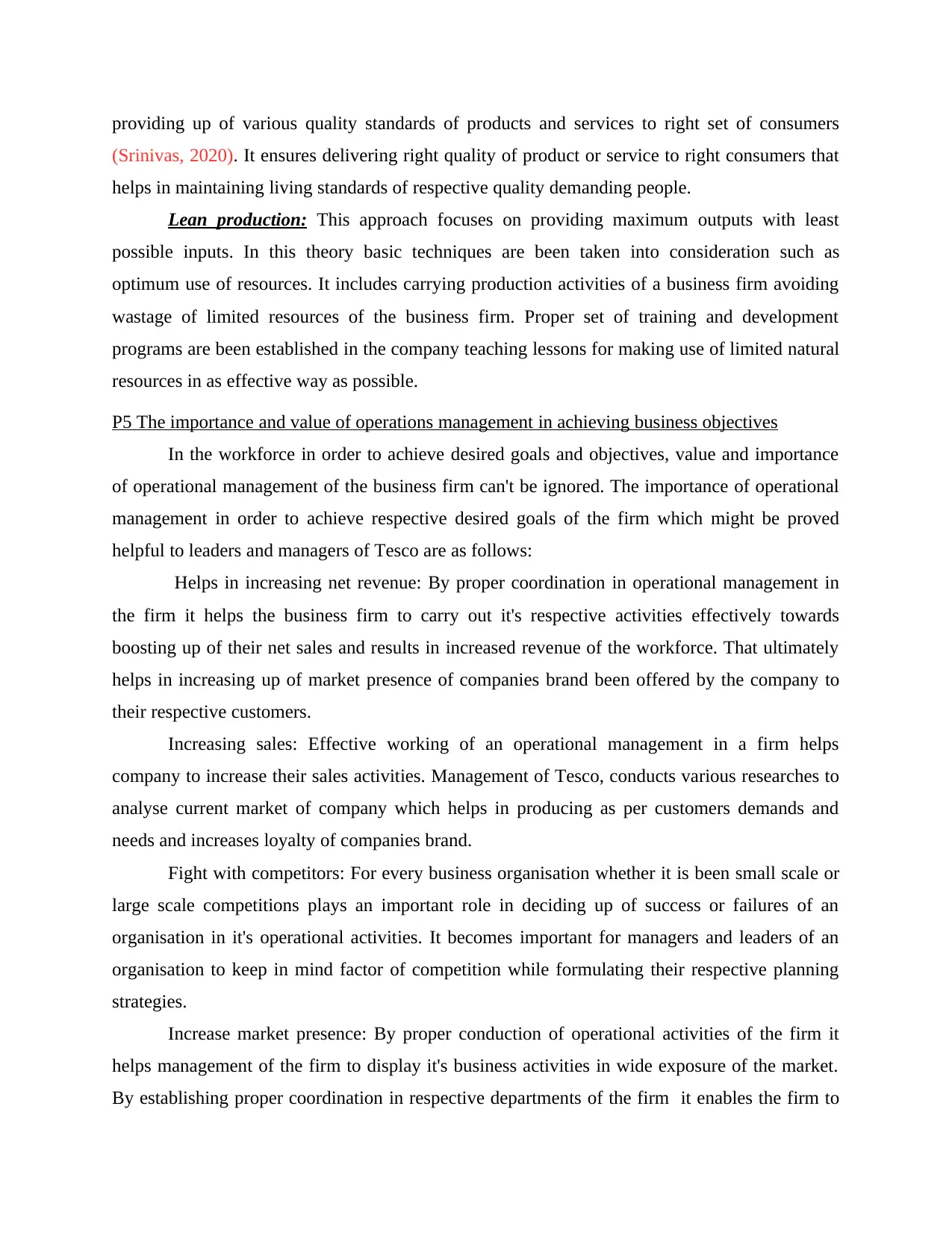
providing up of various quality standards of products and services to right set of consumers
(Srinivas, 2020). It ensures delivering right quality of product or service to right consumers that
helps in maintaining living standards of respective quality demanding people.
Lean production: This approach focuses on providing maximum outputs with least
possible inputs. In this theory basic techniques are been taken into consideration such as
optimum use of resources. It includes carrying production activities of a business firm avoiding
wastage of limited resources of the business firm. Proper set of training and development
programs are been established in the company teaching lessons for making use of limited natural
resources in as effective way as possible.
P5 The importance and value of operations management in achieving business objectives
In the workforce in order to achieve desired goals and objectives, value and importance
of operational management of the business firm can't be ignored. The importance of operational
management in order to achieve respective desired goals of the firm which might be proved
helpful to leaders and managers of Tesco are as follows:
Helps in increasing net revenue: By proper coordination in operational management in
the firm it helps the business firm to carry out it's respective activities effectively towards
boosting up of their net sales and results in increased revenue of the workforce. That ultimately
helps in increasing up of market presence of companies brand been offered by the company to
their respective customers.
Increasing sales: Effective working of an operational management in a firm helps
company to increase their sales activities. Management of Tesco, conducts various researches to
analyse current market of company which helps in producing as per customers demands and
needs and increases loyalty of companies brand.
Fight with competitors: For every business organisation whether it is been small scale or
large scale competitions plays an important role in deciding up of success or failures of an
organisation in it's operational activities. It becomes important for managers and leaders of an
organisation to keep in mind factor of competition while formulating their respective planning
strategies.
Increase market presence: By proper conduction of operational activities of the firm it
helps management of the firm to display it's business activities in wide exposure of the market.
By establishing proper coordination in respective departments of the firm it enables the firm to
(Srinivas, 2020). It ensures delivering right quality of product or service to right consumers that
helps in maintaining living standards of respective quality demanding people.
Lean production: This approach focuses on providing maximum outputs with least
possible inputs. In this theory basic techniques are been taken into consideration such as
optimum use of resources. It includes carrying production activities of a business firm avoiding
wastage of limited resources of the business firm. Proper set of training and development
programs are been established in the company teaching lessons for making use of limited natural
resources in as effective way as possible.
P5 The importance and value of operations management in achieving business objectives
In the workforce in order to achieve desired goals and objectives, value and importance
of operational management of the business firm can't be ignored. The importance of operational
management in order to achieve respective desired goals of the firm which might be proved
helpful to leaders and managers of Tesco are as follows:
Helps in increasing net revenue: By proper coordination in operational management in
the firm it helps the business firm to carry out it's respective activities effectively towards
boosting up of their net sales and results in increased revenue of the workforce. That ultimately
helps in increasing up of market presence of companies brand been offered by the company to
their respective customers.
Increasing sales: Effective working of an operational management in a firm helps
company to increase their sales activities. Management of Tesco, conducts various researches to
analyse current market of company which helps in producing as per customers demands and
needs and increases loyalty of companies brand.
Fight with competitors: For every business organisation whether it is been small scale or
large scale competitions plays an important role in deciding up of success or failures of an
organisation in it's operational activities. It becomes important for managers and leaders of an
organisation to keep in mind factor of competition while formulating their respective planning
strategies.
Increase market presence: By proper conduction of operational activities of the firm it
helps management of the firm to display it's business activities in wide exposure of the market.
By establishing proper coordination in respective departments of the firm it enables the firm to
⊘ This is a preview!⊘
Do you want full access?
Subscribe today to unlock all pages.

Trusted by 1+ million students worldwide
1 out of 17
Related Documents
Your All-in-One AI-Powered Toolkit for Academic Success.
+13062052269
info@desklib.com
Available 24*7 on WhatsApp / Email
![[object Object]](/_next/static/media/star-bottom.7253800d.svg)
Unlock your academic potential
Copyright © 2020–2025 A2Z Services. All Rights Reserved. Developed and managed by ZUCOL.





